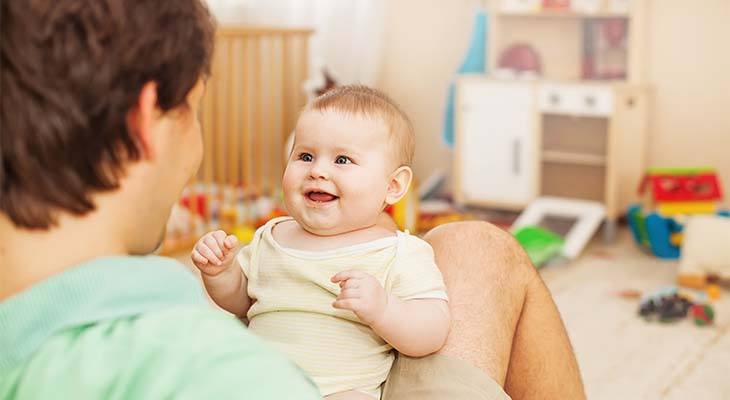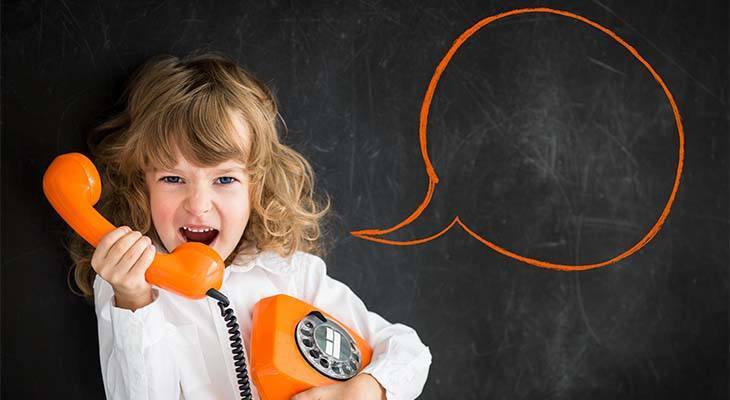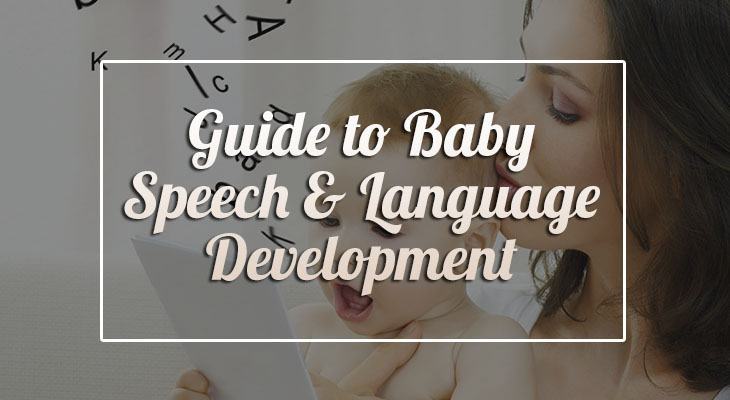A New Parent’s Guide to Baby Speech and Language Development
Parenting is a daunting journey you’d now have to undertake, and you don’t know what to expect. But that’s okay because the internet has tons of information you can look into when you need it the most. One such topic that a lot of new parents want to learn more about is baby speech development.
Speech is one part of child development that parents worry about the most, apart from walking that is. Talking and walking, after all, are the most exciting milestones everyone keeps talking about.
Each parent wants to know when it’s normal for their children to start babbling their first words or take their first steps.
Just remember that your child’s developmental experience might be different from other kids, so it’s okay to be a little earlier or later.
Developing language skills has a broad range, and that’s mostly true for speech milestones as well.
If you want to learn more about general baby stages and milestones, check out these articles – Baby Development, Premature Baby Development, Fetal Development Week by Week and Baby Development Milestones.
After reading this article, you will know:
- How old babies should be able to talk
- How advanced two-year-old speech should be
- What to look out for if you think your baby has delayed speech
- What to expect during speech therapy
- And many more
How to Read this Article
If you are a new parent:
- Learn when your baby should start talking
- Get tips on how to encourage your baby’s speech development
If you are an experienced parent:
- Check if your baby might have delayed speech development
- Broaden your baby knowledge for future reference
If you are a friend of someone who has a baby:
- Learn more about the possible information your friend might want to know
- Share what you know with your friends to help them out
- Share this baby speech development article with your friends
If you just want to gather information about baby development and milestones:
- Read on to learn more about when babies should be able to talk as well as what to do and what not to do if they have delayed development.
Learn more about baby speech and language milestones!
So, when do babies start talking?
Before you get excited about the actual chatter, why don’t we start at the beginning first?
Babies will develop their hearing first. They’ll be listening to the curious sounds around them. After all, that’s what they’ll most likely imitate first.
That’s why it’s important to keep speaking to your baby. Your tone and vocabulary will help them develop their language better.
Once they have grasped the basics of the language around them, speech development soon follows.
There are many methods you can do to aid your child’s talking skills. The easiest and most accessible would be to interact with him. Read stories. Chat. Sing songs. Do everything together and keep talking to him.
There are also mobile apps, TV programs, computer games, and other technology-based devices you can use to help you teach your child new words.
If you want to know more about the different applications and programs you can buy to help your baby learn new things, head on over to the Baby Development App article.
So, in this article, we’ll explore:
- When do babies say their first word?
- 2 year old speech
- 3 year old speech
- Language development in children
- Delayed speech in children
When Do Babies Say Their First Word?

So, really, when do babies talk?
Well, most babies utter their first real word sometime during their first 12 to 15 months. But that’s not a fixed period!
Some babies just love to talk and can utter their first word earlier while others would do so later. That’s okay! A baby’s first words age-wise can happen from as early as 9 months to as late as 18 months (or more).
Either way, the actual thing you have to worry before words and speaking is your child’s language development.
That’s very different from speech!
Language is a whole system of information acquisition. Speech is one language tool that helps us disseminate the information we receive.
So before your child can utter simple verbal cues, he should be able to understand and respond to common gestures and sounds first.
From there, he could learn to imitate those sounds, and that’s what develops into actual speech. Names and common everyday words are the usual words that babies first say because these are the things he hears on a daily basis.
So if Mama is the one taking care of him, there’s a big chance that ‘mama’ would be his first word!
Simply put, repetition is key!
If you want to learn more about the system of language and how it differs from speech, check out the Baby Language Development article.
2 Year Old Speech
How many words should an 18 month old say?
Well, as a rough guide, a baby speech development at this age can say about 30 real words, give or take. They can probably put some of them together to form mini-sentences.
But remember this is a personal endeavor, and your child can be early or late! This is normal, and it’s not a testament of your care or impairment if he is just a little bit late.
By 24 months or 2 years old, your baby would be able to string a few words together. He can now process that language is powerful and can provide him with things that he wants.
That’s why the word ‘more!’ would likely be a favorite by this time.
Their attention span will also be longer by the time they turn 2. So, you now have lots of choices to help you teach him new words. The best apps can be both a learning tool and great entertainment.
If you want to learn more about activities and entertainment that can help your baby learn new stuff, check out the Baby Development Toys article.
Two year old milestones
By the time your child is 2 years old, he would develop better fine motor and communication skills. There will be a few specific 2-year-old milestones that he might be able to do now.
He can now walk and run without assistance, and can even climb up furniture and stairs all on his own. Your baby will also be more independent.
He can open and close faucets. He can pull up his pants. You can even ask him to do simple things like ‘hang up your coat’ or ‘close the door,’ and he’ll do it (well, if he wants to).
Your child will continue to grow physically and mentally from here on out and will learn more complex things as time goes by.
Vocabulary improved
He has a more extensive vocabulary by this time, and might even know about 200 words or more. The easiest for him to remember would be objects he could recognize in his everyday life.
Such things like milk, spoon, door, and etcetera are now ingrained in his mind.
Likewise, his language skills are also improving. He can communicate with you more clearly. He now has a sense of time and might even use phrases to connote it like ‘the other day’ or ‘tomorrow.’
He also knows the basics of pronouns and uses it to mean himself (me) or the person he’s talking to (you).
Speech and language are not the only forms of development your child will encounter. If you want to learn more about the different stages of your baby’s development, check out these articles – Baby Eye Development, Baby Vision Development and Baby Brain Development.
3 Year Old Speech

Your child could be a chatterbox by the time he turns three. Most 3-year-olds already have a vocabulary that consists of about 1,000 words, give or take.
He’ll be able to string more complex sentences, and you can even teach plurals and the present progressive tense (‘-ing’ like ‘is running’ or ‘is cooking’).
Remember that you always have to communicate clearly with your kids to help them gain more skills both in speech and language. 3-year-olds can probably ask their own questions and successfully answer yours. Most 3-year-olds can also be understood by strangers.
It’s also a healthy exercise to read books together and sing songs to keep strengthening his skills in speaking. It’s a great bonding experience as well.
You can also encourage your kid to do a little bit of storytelling all on his own.
Since most kids are well-advanced in terms of their communication skills by this age, you can also clearly distinguish if your child might need some special assistance. It must be reiterated once more that if your kid is just a little slower on the uptake than his peers, this doesn’t necessarily mean something’s wrong!
Your little one might just be taking his sweet time. But if you strongly suspect that he has a speech delay, it’s also okay to visit the pediatrician to have it diagnosed.
Language Development in Children
Newborns and babies up to one month of age will do a lot of crying. Don’t be alarmed! Crying is their way of communicating with you.
When your baby cries, it means that he needs (or wants) something. It could be milk or a new diaper, or he just misses you and wants a cuddle.
As he grows older, your baby will learn new ways to express himself.
At first, he will start cooing, and then it will turn into babbling. As he explores and listens to his environment, he will begin to imitate the sounds around. That’s why your baby’s family (that’s you!) should keep interacting with him.
Sure, he doesn’t look like he understands you right now, and you won’t understand him this time as well. But constant interaction allows him to process the social and language cues he needs to further his speaking skills.
Before you know it, he’ll be talking non-stop, and all you’d want is to keep him quiet!
The average age at which kids utter a bona fide first word is 12 months, and they’re able to manage two-word “sentences” by the time they’re 2. But (reality check!) as any pediatrician will attest, babies hit language milestones at a wide range of ages. – Parenting.com
Some kids might encounter speech problems as they grow older. It’s a known fact that it commonly occurs in male babies than females, but the exact reason is still debatable. Speech delay is not as uncommon as you think.
It’s a good thing that speech therapy is more accessible nowadays. You could have your little one assessed by a speech therapist and determine whether he needs special assistance or not. If he does, then you know he’ll be in good hands. If he doesn’t, you can still get expert tips on how to improve his speaking at home.
Watch and sing kid’s songs on the internet to keep your toddlers engaged and excited! You can subscribe to the Mother Goose Club.
Delayed Speech in Children

Your 18 month old is not talking whatsoever, and you’re worried. It might be time to go to the doctor as this can be a sign of something more serious.
Take note of the word, CAN. It can also mean that your toddler is just taking his sweet time learning his first words.
Speech delays occur for many reasons, including hearing loss and developmental disorders. Depending on the circumstances, your child’s doctor might refer your child to a hearing specialist (audiologist) or a speech-language pathologist. – Mayo Clinic
Some other disorders that cause speech delay are prematurity, neurological problems like cerebral palsy, autism, apraxia of speech, and the like.
Yes, it’s alarming to read the possible reasons why your child might not be talking, but please remember that it’s just a possibility. That’s why it’s important to seek medical help.
Consulting with a professional can give you an official diagnosis and help equip you with more knowledge to move forward.
At the end of the day, you know your child the best. After all, you’re the one he’s with daily. If you think that he’s just calmly taking in his surroundings and just not ready to talk yet, relax.
If you feel it in yourself and observe things he does (or do not do) that raises alarm bells, there’s nothing wrong with going to a speech therapist to help calm you down.


